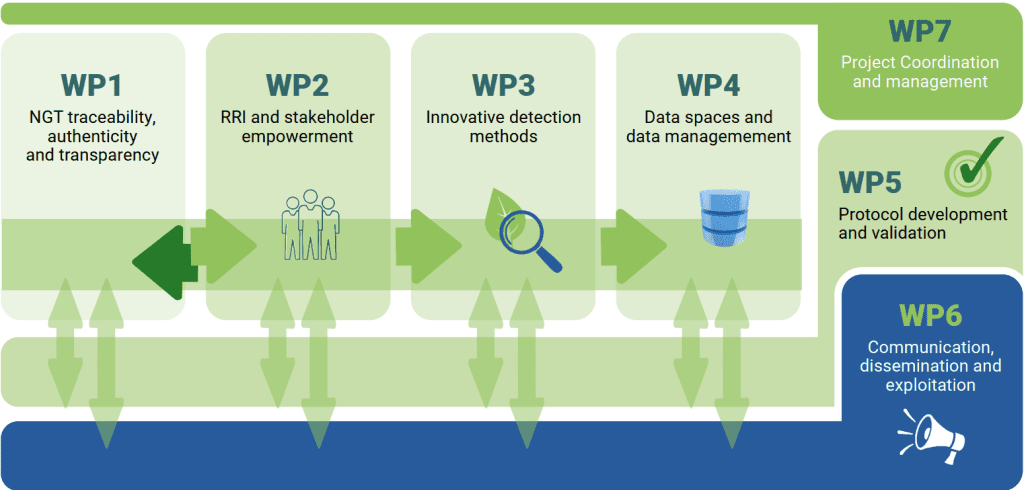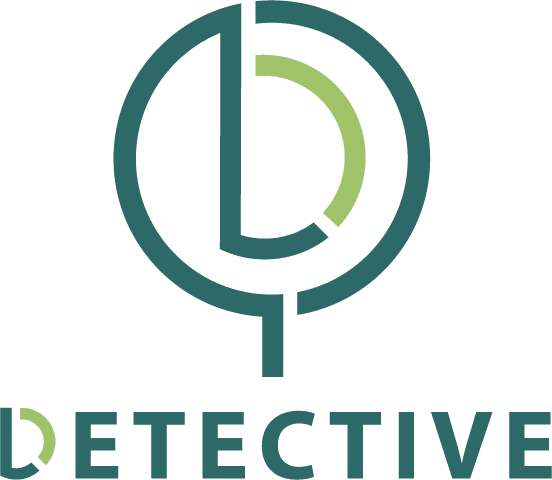DETECTIVE’s work is organised into integrated work packages (WPs), primarily focused on developing technical detection methods (WP3-WP5). These efforts are contextualised within socio-economic and regulatory frameworks (WP1), with additional emphasis on stakeholder engagement and empowerment through co-creative systems mapping and RRI (WP2). The project’s impact is facilitated by dedicated communication and dissemination efforts (WP6), while project coordination and management ensure efficient collaboration (WP7).

WP1 – Integrative strategies for traceability, authenticity, and transparency of NGT products along the agri-food chain
The objective of WP1 is to evaluate various methods for authenticating food products derived from NGTs while considering their socio-economic implications. This will involve comparing the economic effects of different strategies, distinguishing between impacts on the EU and the global community, as well as various stakeholders within the EU, such as developers (breeders), farmers, agri-food operators, traders (importers, exporters), and consumers. WP1 aims to pinpoint “areas of concern” by aligning detection technologies and other authenticity measures with identified needs. Furthermore, WP1 will contribute to the development of governance options that comprehensively address these areas of concern.
WP2 – Empowerment and responsible research and innovation
WP2 is dedicated to maximising the impact of developed detection methods, tools, and protocols by empowering stakeholders. Regular assessments will track regulatory and technical developments. Engaging enforcement authorities, laboratories, developers, and agri-food operators from the project’s start, WP2 will co-create action plans to build necessary capacities. The NGT Community of Practice will foster collaboration, enabling DETECTIVE to propose policy recommendations. WP2 will establish a sustainable post-project empowerment program with tailored training modules. The DETECTIVE Multidimensional Decision Tree will facilitate swift enforcement capacity building.
WP3 – Innovative detection methods
WP3 aims to develop and evaluate novel techniques for detecting gene-edited or cisgenic organisms in both pure and mixed products. It will also establish a practical strategy for distinguishing between these organisms and conventional ones. Methods will be developed for known mutations, multiple mutations, and unknown mutations, applicable across various organisms (plants, animals, etc.). WP3 will collaborate closely with other work packages to select methods and strategies in line with the legal framework. Large datasets will inform the setup and analysis of techniques for unknown target screening. WP3 methods will be validated in relevant enforcement laboratory settings.
WP4 – Collecting, structuring, and sharing NGT information in and via a data space
The aim of WP4 is to gather pertinent data and knowledge essential for detecting and identifying NGTs and their products. This data will be meticulously stored in a structured and secure manner, ensuring accessibility to partners and stakeholders. This transparency will shed light on the technology’s utilisation in the agri-food chain. WP4 will also devise knowledge-based discovery and screening tools, utilising machine learning algorithms to identify unknown NGTs. These databases will inform the development of both targeted and untargeted detection methods.
WP5 – Protocol development and assay validation
WP5 aims to provide validated methods through the development of appropriate Standard Operating Procedures (SOPs) and validation protocols, followed by execution of validation via inter-laboratory testing. Validation will encompass at least one method for each of the targeted, multi-targeted, and untargeted groups. Methods showing satisfactory performance in pre-validation trials will undergo inter-laboratory method validation, conducted as collaborative ring trials. These trials will adhere to best measurement practices and relevant standards, with consultation from JRC EURL-GMFF to ensure optimal deployment. Ultimately, three validated methods, along with corresponding validation reports, will be made publicly available.
WP6 – Dissemination, exploitation and communication
WP6 will share information with all concerned actors/stakeholders identified through the detailed mapping in WP2 which will be completed under this WP. It will support efficient C&D activities with clear but varied tools, tailored to each target group, and the key elements to be communicated and monitored through a series of dedicated KPIs. This will facilitate knowledge transfer to stakeholders all along the agri-food supply chain. Moreover, we will combine stakeholders and target groups engagement (input) with a targeted DEC strategy (output) to fully exploit the project’s results. WP6 will have mutual exchange with all the other WPs to co-design the content of DEC items and to manage IPR issues resulting from the R&I activities. All project partners will actively participate to each task of this WP.
WP7 – Project coordination and management
WP7 is focused on orchestrating the integrated coordination and management of DETECTIVE. Its primary goal is to facilitate a seamless exchange of information and foster collaboration among partners. This includes ensuring effective communication with the European Commission (EC), encompassing both scientific and financial reporting. Moreover, WP7 will oversee quality assurance and risk management processes. In addition to core technical, administrative, and financial tasks, WP7 will prioritise the application of Responsible Research and Innovation (RRI) principles and dimensions throughout the project. This entails integrating RRI principles into innovation activities and stakeholder engagement processes.
